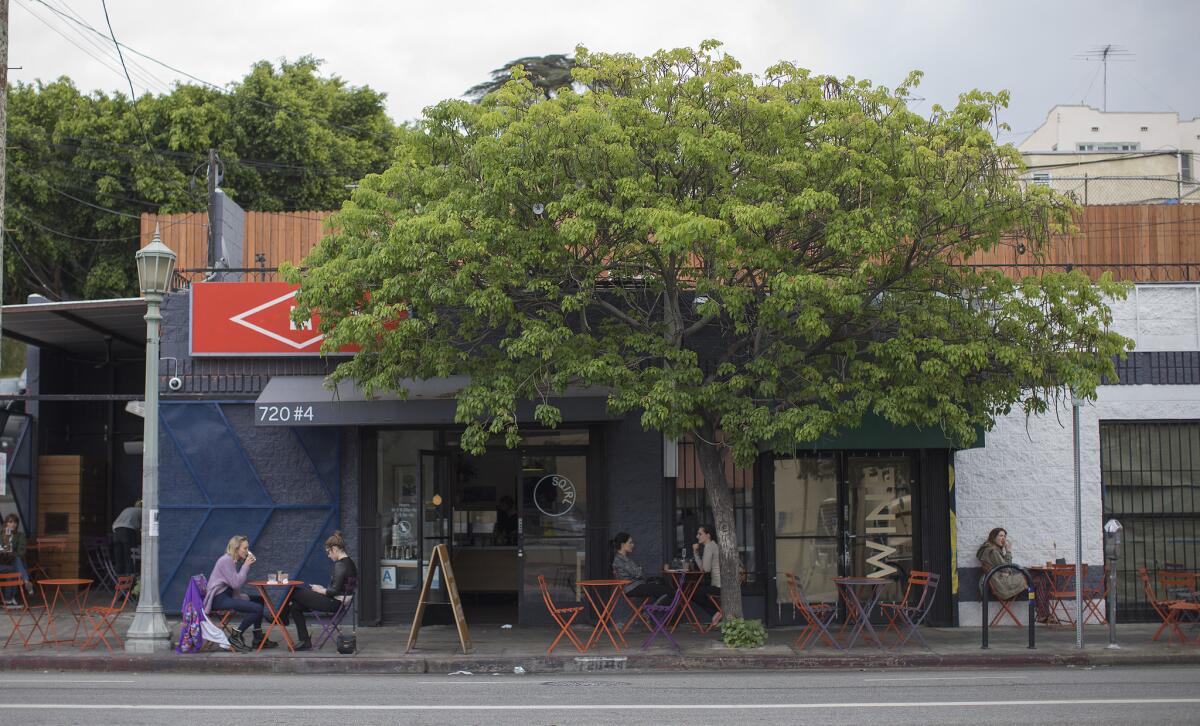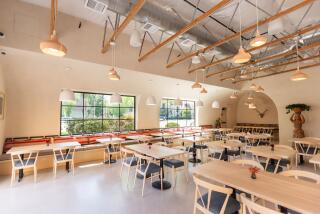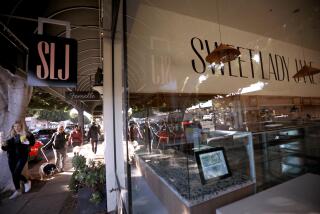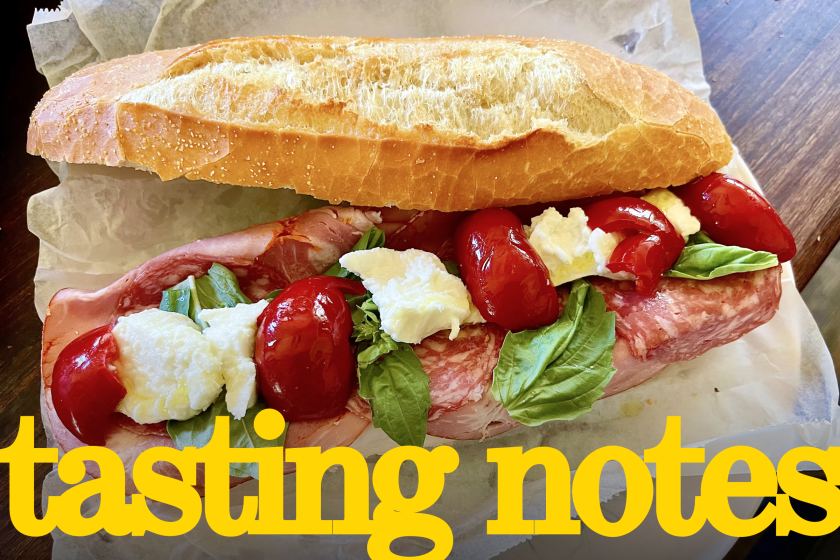Sqirl owner Jessica Koslow addresses moldy jam and food safety allegations as former employees speak out

Sqirl, the popular Virgil Village brunch spot owned by Jessica Koslow, was battered this weekend by allegations that the restaurant operated under unsafe and unsanitary working conditions for years. Among the allegations: Jams were not stored correctly, allowing for severe mold growth; the restaurant had rodent infestations that were not dealt with in a timely fashion; and the facility housed an unpermitted kitchen space that was intentionally concealed from health inspectors.
The allegations were compiled on Instagram by Joe Rosenthal, a Minnesota-based mathematician and food blogger whose work seeks to investigate “problematic figures in the food industry.” He said he became aware of potential concerns at Sqirl last week after seeing a tweet that linked to an Instagram account, @sqirltruth.
Rosenthal said that he had contacted more than a dozen current and former Sqirl employees since Saturday, all of whom, he said, shared similar accounts of improper food storage and safety practices at the restaurant; screenshots of those purported conversations were then posted to his Instagram account. (The Times interviewed some of the same employees, who confirmed Rosenthal’s account.)
Most prominent among the allegations was the claim that Koslow had instructed employees to scrape layers of mold from refrigerated jam buckets, serving the remainder to guests at the restaurant or packaging it in jars for retail distribution. Rosenthal also posted an image, allegedly sent by a Sqirl employee, of what appears to be a jam-filled plastic bucket covered with a thick layer of mold that had been partially scraped using rubber spatulas.
Sqirl, which opened in 2012, has emerged as one of L.A.’s most recognized restaurants over the last decade, garnering accolades from critics and publications nationwide and developing a significant following for its brand of stylized comfort foods, including jam-topped ricotta toast. Long lines outside its East Hollywood storefront were a regular occurrence.
Koslow has been nominated for a James Beard Award for her work at Sqirl and was in the second class of the Master Food Preserver cohort in Los Angeles, a program run by the University of California’s Cooperative Extension. She is slated to release her second cookbook, covering the topic of jam making, on July 21.
In response to the allegations, the restaurant posted a statement to its Twitter and Instagram accounts Sunday confirming that “mold would sometimes develop on the surface” of its bulk jams due to its low sugar content, similar to “types of mold that develop on some cheese, charcuterie, dry aged beef, and lots of other preserved foods.”
On Monday, Koslow issued a statement to The Times apologizing to customers and employees.
“All of the retail jam we have ever sold — which is to say the jam in jars that is bought from us and at stores — is pasteurized and canned with the “hot pack” method that makes the growth of mold basically impossible. That same recipe is used in the restaurant, but because the jam is low in sugar and we don’t use chemicals or preservatives, there were occasional instances where mold would develop on the surface.
“When this happened we would remove it. To guide this practice I relied on the research and guidance of health experts and to my knowledge thought it was safe.
“I eat the same jam I serve my customers, family and friends and would never knowingly serve any food that would put their health at risk. I realize that I was wrong and I am sorry,” she said.
The restaurant’s social media statement said that the process for dealing with mold growth was done “under the guidance of preservation mentors and experts like Dr. Patrick Hickey, by discarding jam several inches below the mold, or by discarding containers altogether.”
Hickey, an Edinburgh-based mycologist and fungal expert, was quoted in a 2014 BBC story stating that moldy jam was safe to consume once the mold had been removed and the jam was consumed immediately. Reached by phone, however, Hickey explained this practice was only acceptable in very limited quantities. “A small amount of mold on the jam in your fridge likely won’t hurt you,” he said, but added that the production of jam in large amounts in a commercial kitchen is a different issue. He also said he was not familiar with Sqirl or Koslow and had never spoken with anyone at the restaurant regarding the handling of mold.
The risk of food-borne toxins, which some molds produce, is much greater with substances in a gel or porous form, such as jam, compared with dry-aged meats or cheeses, Hickey said. “My recent research shows that spores can grow quite deep into a gel as they disperse,” he added. “Since the mold will continue to spread and create a dusting of spores, it becomes a significant concern for those who are exposed to that environment repeatedly.”
In its official guidelines regarding mold growth on foods, the USDA suggests that any jam or jelly with mold should be discarded: “The mold could be producing a mycotoxin. Microbiologists recommend against scooping out the mold and using the remaining condiment.”
Gelyn Montanino, a former pastry chef at Sqirl, said that moldy jam buckets continued to be an issue at the restaurant when she was hired in August 2019. “I was immediately disgusted,” she recalled. “I asked about it and no one had a real reason as to why it was that way. Almost all the buckets would have a thick layer of mold on top with no lids or wrap. I’ve witnessed cooks scraping the mold off and putting the jam into their pans for the line.”
Former employees also told The Times that improper jam storage was not the only issue regarding food and employee safety at Sqirl.
Sasha Piligian, a former pastry chef who worked at Sqirl from 2016 to 2019, referred to the “mold story” in an email interview and also mentioned the “illegal kitchen which we all worked in for years, hiding from the health department.”
Elise Fields, a baker at Sqirl from 2018 to 2019, said she could confirm the allegations that Rosenthal posted.
“The majority of my time there was spent working out of that kitchen, which was cramped, infested, unsafe and had zero ventilation,” Fields said. “During a surprise health inspection myself and another cook once had to hide and lock ourselves inside for the duration of the inspection which took over an hour to complete. ... The entire prep area, dry storage, walk-in, storage areas and basically every aspect of the non-cafe area were horrendous and unorganized and easily the least hospitable environment I’ve ever worked in.”
Prior to a major remodel of Sqirl in 2018, very little about the restaurant was “up to code,” according to a former manager who asked to remain anonymous due to concerns over future employment and who also said the restaurant had a vermin problem.
Koslow, however, said that Sqirl “does not and has not had a rat problem.” She also addressed allegations regarding a “secondary kitchen space” that was acquired in 2013.
“Around that time, our secondary kitchen fell off the radar of the Health Department, despite the fact that Sqirl’s main kitchen received regular inspections,” she said. “Ashamedly, I took advantage of their oversight and did the best we could as we used Sqirl’s main kitchen for all our restaurant orders including jam, and used the secondary kitchen primarily for baking and food prep. We were at risk of being shut down, but in our industry, this is common and I was just focused on keeping the lights on and keeping my team employed.”
According to L.A. County health department records, Sqirl was inspected by officials at least 15 times since September 2015 and never received a health rating score below 91.0, which constitutes an “A” rating. An email to the county’s Department of Health regarding the allegations against Sqirl was not immediately returned.
Koslow said she is changing the jam program by implementing a pasteurized “hot pack” method — the same technique she said was used previously for retail products — for all jam used in the restaurant. She also said she would submit samples of the jam to an independent lab, Certified Laboratories Inc., for testing to ensure its safety and longevity.
“I know I have lost the trust of our loyal customers, partners, and jam subscribers and hope that my sincere regret and these changes demonstrate that I have learned from my mistake and are enough to earn a second chance from them,” Koslow said.
As news of the allegations spread, some retailers — including Now Serving and DTLA Cheese — pulled or were considering pulling Sqirl jam products from their shelves. A statement from Diaspora Co., a sustainable spice company known for its single-origin turmeric, said that after “hours of conversations with Sqirl employees (current and former), a mold expose and some difficult convos with Sqirl leadership,” it considered its recent jam collaboration with Sqirl to be “a mistake.”
The company removed the remaining jars from its site and is offering refunds to customers who had purchased the product.
More to Read
Eat your way across L.A.
Get our weekly Tasting Notes newsletter for reviews, news and more.
You may occasionally receive promotional content from the Los Angeles Times.










